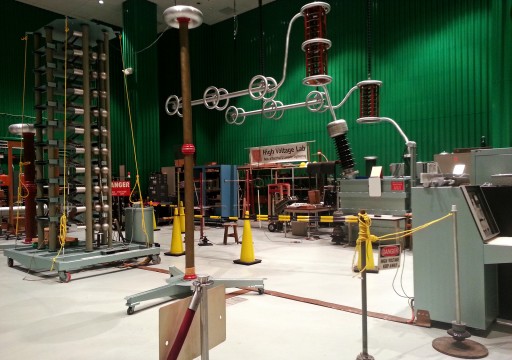
The Electrical and Computer Engineering High Voltage Lab awaits student work on Sept. 21. The lab, located in the basement of Dreese Laboratories, can house upwards of 5 million volts of energy. Credit: Rubina Kapil / Lantern reporter
One Ohio State course is striking the fancy of many students.
With a 3,600-square-foot facility capable of powering up to 5 million volts, OSU’s High Voltage Engineering and Laboratory course (ECE 5047) isn’t something typically seen at most universities in the nation, said Jin Wang, an associate professor within the Department of Electrical and Computer Engineering who teaches the course.
The lab course is one of only a few to use such high power applications, according to the laboratory’s website.
The course enhances engineering principles through lectures twice a week, and 12 labs over the course of the semester, Wang said.
To explain and demonstrate principles of high voltage engineering, lab experiments begin with small-scale voltage-dependent tests that create “sparks” and eventually lead up to “the big bang experiment, the one in which you utilize an impulse generator and witness artificial lightning strikes,” Wang said. “Even the student who might be asleep in lecture is energized for these demonstrations.”
The major equipment for the course cost more than $400,000, Wang said. All other major equipment in the lab is either donated or purchased with a research grant, so there is no additional cost for students.
And even the course’s teachers are jolted by the class.
Course teaching assistant Xuan Zhang took the class as an undergraduate and said the course is “quite cool” because it verifies various theories through experiments that involve sights and sounds.
Those experiments are what drive so many students to try to enroll in the class, Zhang said.
Xiu Yao, a graduate research associate who took the course as an undergraduate, agreed that the experiments draw a lot of students.
“The class fills up very quickly, (because) the labs are very interesting and you get to see all sorts of phenomena,” Yao said.
It is only offered during Spring Semester each year with 45 open spots, and is highly competitive, Wang said.
Hasan Mujahid, a graduate student in electrical and computer engineering, said he always had a hard time getting into the course as an undergraduate.
“I wanted to take (ECE 5047) while in undergrad because it’s a class that is not offered everywhere and you get to use a lot of the ECE material you learn through major classes,” Mujahid said. “But every time my registration window would open and I would try sign up, the class would already be full.”
Some students who have taken the course said they found it to be helpful for post-graduate job opportunities.
“A background in a high voltage class gives students qualifications to fit in more job openings because it is so unique, and the lab reports for the course train students in technical writing, which is also important for their future careers in the field,” Yao said.
After the semester, the lab hosts an open house for enrolled students to bring their family and friends to witness demonstration experiments from the semester, Wang said.
He also said he hopes the department will be able to offer the class throughout the year, but for now it will be first come, first serve for those engineers with the fastest fingers on registration day.


